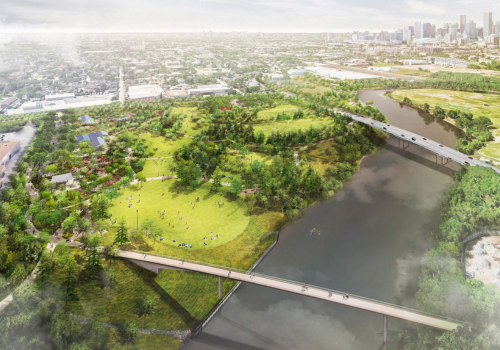Mayor Turner Addresses COVID Response, Resiliency and More in 2020 State of the City
Published Oct 22, 2020 by A.J. Mistretta
Houston Mayor Sylvester Turner discussed the City’s response to the COVID-19 pandemic, economic concerns and efforts to grow the next generation of local companies in his 2020 State of the City address.
“As we move forward through these unprecedented times, the City’s foundation is strong; the City itself is resilient; and the City’s future is bright,” Mayor Turner said.
The Mayor delivered his fifth State of the City address, hosted by the Greater Houston Partnership, on October 22. He said while each of those speeches has been special in different ways, “this one, during an unprecedented year, is significant while we are in the midst of a global pandemic, social and civil unrest, economic instability and a highly charged election season.”
The city has battled the COVID-19 pandemic on several fronts over the last seven months, from leveraging new public health resources to developing small business assistance programs. Mayor Turner praised the Houston Health Department for leading “one of the most remarkable responses to the pandemic in the country.” The department has established numerous free testing sites and hired more than 300 contact tracers to help stop the virus’ spread.
In April, Mayor Turner tapped former Shell Energy CEO Marvin Odum to lead Houston’s COVID Response and Recovery. That same month he launched the Houston Health Equity Response (H.E.R.) Task Force to provide resources and education to the city’s vulnerable and at-risk populations.
So far, the Mayor said, the task force has:
- Distributed 1.3 million masks
- Made more than 4,000 food and supply deliveries
- Created the successful Mask Up! Campaign
- Hosted several virtual town halls to provide support and resources to those facing mental health challenges as a result of the pandemic
The City of Houston also created a rental assistance program for residents and established a $20 million fund for grants to small businesses.
Addressing the convention and meetings business that contributes considerably to the local hospitality industry and helps fund city promotion, Turner said nearly 200 conferences and conventions have been cancelled or rescheduled since March—a $332 million economic hit. Houston First Corporation, the agency charged with booking conventions and marketing the city as a destination, has managed to rebook 23 out of the 24 citywide conventions that were planned during the period for future dates.
“This was a critical and proactive response that will provide economic resiliency in the years to come, yet the impact for 2020 and into 2021 will be significant for our hospitality community,” the Mayor said.
In February, the City launched Resilient Houston, a framework for how Houston should address future challenges and sudden shocks, from transportation infrastructure to natural disasters. Two months later, the city unveiled its first ever Climate Action Plan with a goal of reaching carbon neutrality by 2050. The Mayor said more than 5,200 individuals participated in the inaugural Climate Action Week to help kick off implementation of that plan. These efforts followed the late-2019 launch of Evolve Houston, a public/private partnership with NRG, Shell, CenterPoint, the University of Houston and Houston Sustainability Office to accelerate electrification of private and commercial fleet vehicles in the city.
Mayor Turner said that this year the City received its latest hazard mitigation grant from Federal Emergency Management Agency to help combat flooding. It’s the fourth and final grant the City sought to complete large scale flood mitigation projects in the most vulnerable areas.
Turning to efforts to grow Houston’s technology and innovation ecosystem, Mayor Turner pointed to several announcements this year that have positioned the City to increase entrepreneurship and digital skills.
- In September, the Rice Alliance announced the creation of a new clean energy accelerator to help create a new generation of young entrepreneurs focused on our energy future.
- In June, Greentown Labs, the nation’s largest climatech incubator out of the Boston area, announced plans to open a Houston incubator next year in the 16-acre Midtown Innovation District. The 40,000-square-foot Greentown Houston will have space for up to 50 emerging companies. They announced Greentown Houston's inaugural members in October.
- The City has also expanded its digital alliance with Microsoft through the tech company’s Accelerate program. The program is designed to address economic recovery through skilling both underserved communities and re-skilling the many Americans impacted by COVID-19.
“Houston is a City that continues to transform, to innovate and to be an example for the rest of the country on how to be diverse, welcoming and inclusive,” Mayor Turner said. “As we gradually take steps to reopen, we recognize that the full recovery will take several years, but when we work together, we put ourselves in the best position to manage the virus and rebound from it.”
In opening the event, Partnership President and CEO Bob Harvey said 2020 has proven to be among the most difficult years in Houston’s history. "The COVID-19 pandemic, the fall of the oil markets, renewed alarm over racial injustice—these issues and others have presented considerable challenges for our city and others around the country,” Harvey said. “But time and again, I’m amazed by the resiliency and perseverance of Houstonians to rise to the challenge. Throughout these last seven months, Houston has shown the world what it’s made of—working to fix broken systems, growing new industry sectors, and creating a better quality of life for all who call this place home.”
The Mayor addressed other issues including racial justice, homelessness, mental health and street infrastructure in his speech. Watch the full presentation on this page when it's posted later this week.
 The Houston Report
The Houston Report




















